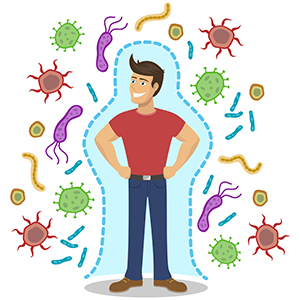Your Best Shot Against the Flu
Millions of people get sick with the flu each year. Even worse, complications from the flu can be life-threatening. Prevent the flu – and the severe complications it can lead to – from happening to you and your loved ones.
What is the Flu?
The flu is a contagious respiratory illness caused by the influenza virus. It’s spread through droplets that project when an infected person coughs, sneezes, or talks. These droplets can land in another person’s mouth or nose or be inhaled into the lungs during person-to-person contact. They can also be transferred to the mouth or nose after touching a surface where these droplets have landed.
The flu often starts abruptly and the effects can be felt throughout your whole body. Symptoms include:
- Fever (or feverish symptoms like the chills)
- Cough
- Sore throat
- Runny or stuffy nose
- Muscle or body aches
- Headaches
- Fatigue (tiredness)
- Possible vomiting and diarrhea (more common in children)
Prevent the Flu
One of the best ways to protect against the flu is getting your annual flu shot. A new flu shot is made each year to protect against the flu viruses predicted to cause outbreaks during that flu season.
More ways to avoid the flu:
- Limit contact with sick people
- Wash your hands frequently with soap and water
- Avoid touching your face (rubbing your eyes, for example) without clean hands
How the Flu Shot Works

The flu shot introduces a type of protein (antibodies) to your immune system. It also contains an inactive form of the virus that causes the flu. This provides a type of blueprint for your immune system so it can learn to recognize and defeat these viruses.
Now when the real flu strikes, it’s far less likely to make you ill. Because the viruses used in the flu shot are inactive, you cannot get the flu from the vaccine itself. Learn more about the benefits of receiving your annual flu shot.
The Best Time to Get your Flu Shot
It takes about two weeks for the antibodies from the flu shot to form in your body. Getting your flu shot before the flu season starts to peak (usually early fall to late winter) allows these antibodies to fully develop.


